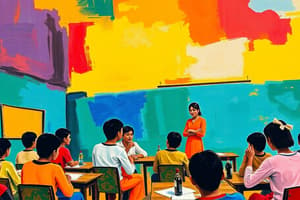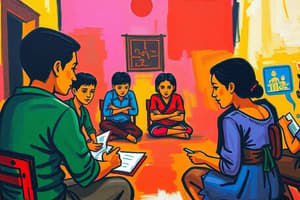Podcast
Questions and Answers
What characterized the education system during the Pre-Spanish period in the Philippines?
What characterized the education system during the Pre-Spanish period in the Philippines?
- It was highly formal and structured.
- Only religious teachings were provided.
- It involved formal classroom learning with designated teachers.
- Education occurred in homes and was informal. (correct)
Which of the following was NOT explicitly mentioned as a feature of education during the Pre-Spanish period?
Which of the following was NOT explicitly mentioned as a feature of education during the Pre-Spanish period?
- Involvement of parents as teachers.
- Learning through apprenticeships.
- Emphasis on theoretical education.
- Use of written examinations. (correct)
Which of the following aims of education in the relevant period focuses on cultural integration?
Which of the following aims of education in the relevant period focuses on cultural integration?
- Education for conformity. (correct)
- Education for brute survival.
- Education for technology advancement.
- Education for wealth acquisition.
What was a primary method of learning during the Pre-Spanish period?
What was a primary method of learning during the Pre-Spanish period?
Who was responsible for providing education in ancient Filipino communities?
Who was responsible for providing education in ancient Filipino communities?
What aspect of education involved practical skills such as hunting and farming?
What aspect of education involved practical skills such as hunting and farming?
Which of the following options does NOT represent a characteristic of education during the Pre-Spanish period?
Which of the following options does NOT represent a characteristic of education during the Pre-Spanish period?
What significant change in education was introduced by the Jesuits in the Philippines?
What significant change in education was introduced by the Jesuits in the Philippines?
What aspect of education was heavily emphasized during the Spanish colonial period?
What aspect of education was heavily emphasized during the Spanish colonial period?
Which of the following was a contribution of the Spanish education system?
Which of the following was a contribution of the Spanish education system?
What change in education occurred during the American period?
What change in education occurred during the American period?
Which characteristic describes the education system established during the Spanish colonial period?
Which characteristic describes the education system established during the Spanish colonial period?
What was a primary aim of education during the American period?
What was a primary aim of education during the American period?
Which of the following statements is true regarding the school curriculum during the Spanish period?
Which of the following statements is true regarding the school curriculum during the Spanish period?
What was a prevalent feature of classroom environments during the Spanish colonial education?
What was a prevalent feature of classroom environments during the Spanish colonial education?
What was the effect of the establishment of parochial schools by Spanish missionaries?
What was the effect of the establishment of parochial schools by Spanish missionaries?
What type of education was primarily provided to indigenous children during the Spanish Colonial Era?
What type of education was primarily provided to indigenous children during the Spanish Colonial Era?
Which religious organization is credited with establishing the first school in the Philippines?
Which religious organization is credited with establishing the first school in the Philippines?
Which of the following subjects was NOT included in the educational curriculum during the Spanish period?
Which of the following subjects was NOT included in the educational curriculum during the Spanish period?
What goal did the education system during the Spanish Colonial Era aim to achieve?
What goal did the education system during the Spanish Colonial Era aim to achieve?
Which legal mandate was significant for the education system in the Philippines during the Spanish period?
Which legal mandate was significant for the education system in the Philippines during the Spanish period?
During the Spanish period, which of the following was a primary method of teaching used by tribal tutors?
During the Spanish period, which of the following was a primary method of teaching used by tribal tutors?
What vocational skills were taught to children during this period?
What vocational skills were taught to children during this period?
What role did the Franciscans play apart from establishing churches during the Spanish period?
What role did the Franciscans play apart from establishing churches during the Spanish period?
What was one of the main student demands during the early years of the martial law regime?
What was one of the main student demands during the early years of the martial law regime?
Which organization was established during the Marcos regime to address student and youth affairs?
Which organization was established during the Marcos regime to address student and youth affairs?
Which law established the Commission on Higher Education in the Philippines?
Which law established the Commission on Higher Education in the Philippines?
What significant change occurred in the education system in 1992 in the Philippines?
What significant change occurred in the education system in 1992 in the Philippines?
Who served as the Education Secretary during the Marcos regime?
Who served as the Education Secretary during the Marcos regime?
Which test was abolished by Republic Act 7731?
Which test was abolished by Republic Act 7731?
What was one aim of Presidential Decree No. 6-A?
What was one aim of Presidential Decree No. 6-A?
During which political period was the surge of student activism noted?
During which political period was the surge of student activism noted?
What was the primary goal of the Japanese educational policies in the Philippines?
What was the primary goal of the Japanese educational policies in the Philippines?
Which subject was NOT included in the changes to the curriculum during the Japanese occupation?
Which subject was NOT included in the changes to the curriculum during the Japanese occupation?
What was one of the intended outcomes of the Education Act 1901?
What was one of the intended outcomes of the Education Act 1901?
What did the Japanese aim to achieve by promoting vocational education?
What did the Japanese aim to achieve by promoting vocational education?
Which of the following was NOT a curriculum change during the Japanese occupation?
Which of the following was NOT a curriculum change during the Japanese occupation?
Why did the Japanese promote the study of the Japanese language in the Philippines?
Why did the Japanese promote the study of the Japanese language in the Philippines?
What was an educational goal related to materialism during the Japanese occupation?
What was an educational goal related to materialism during the Japanese occupation?
What was the focus of Presidential Decree No. 6-A created during the Japanese occupation?
What was the focus of Presidential Decree No. 6-A created during the Japanese occupation?
Flashcards are hidden until you start studying
Study Notes
Pre-Spanish Period
- Ancient Filipinos lived in scattered barangays, ruled by different chieftains.
- Although living separately, they shared similarities in religion, dress, housing, government systems, marriage practices and economic activities.
- Education was informal, incidental, and unstructured.
- Formal instruction began in homes through apprenticeships.
- Human learning resulted from individual experiences.
- Practical education included domestic chores and skills in hunting, fishing, and farming.
- Theoretical education covered morals, spirituality, laws, codes, and worship practices.
- Every home served as a school.
- Teachers were parents and tribal leaders.
### Spanish Period
- The Spanish Colonial Era began in 1521 with the arrival of Ferdinand Magellan.
- The history of the Philippines during this period spans from 1521 to 1898.
- Indigenous education was primarily seen as the responsibility of religious organizations.
Aims of Education
- Education was religion-centered.
- Education was primarily for the elite.
- Spanish language was mandatory.
- Boys' and girls' schools were segregated.
- Education was inadequate, suppressed, and controlled.
Method/System of Education
- Spanish education played a major role in transforming Philippines education.
- The oldest universities, colleges, vocational schools, and the first modern public education system in Asia were established during this period.
- Friars established parochial schools linked with churches to teach catechism to the natives.
##### Relevant Laws
- Royal Decree of 1863: It established a complete, free, and organized education system.
- The decree also established Normal schools.
- The curriculum underwent significant reform.
- Government supervision and control of schools replaced the 3-century church domination in education.
Contributions
- Development of Philippine education.
- Establishment of a public school system.
- Training of teachers.
- A complete system of education.
- Church domination in education.
- Production of grammars and dictionaries.
American Period (1898-1946)
Aims of Education
- To spread the English language to the Filipinos.
Relevant Laws
- Education Act of 1901: Act No. 74
- To promote elementary and vocational education.
- To develop a love for work and dignity for labor.
Japanese Period (1942-1945)
Aims of Education
- To spread the Japanese language in the Philippines.
- To promote vocational education.
- To inspire Filipinos to love their neighbor.
- To promote the enrichment of Filipino culture.
- To recognize the Philippines as part of the Greater East Asia Co-Prosperity Sphere.
- To raise the morality of Filipinos.
- To learn and adapt the Nippongo language and stop using English.
Relevant Laws
- Military Order No. 2 (1942):
- Japanese educational policies were implemented.
- The Philippine Executive Commission established the Ministry of Education, Health, and Public Welfare.
- Schools reopened in June 1942 with 300,000 students.
New Society Period (1965-1986)
Historical Background
- Marcos Regime (1965-1986):
- Martial Law was declared in September 1972.
- Student activism surged during the late 1960s and early 1970s.
- Onofre Corpuz served as the Education Secretary.
- The Youth and Student Affairs Board was established, composed of 15 members representing different student organizations.
- Students demanded these:
- Reduced tuition fees.
- Greater press reforms and press freedom.
- Autonomy for student organizations.
- Student participation in school policy formulation.
- Improved quality of education in terms of instruction and facilities.
Aims of Education
- Presidential Decree No.6-A:
- Provide broad general education.
Relevant Laws
- Presidential Decree No. 6-A (1972): This decree defined the purpose and scope of education in the Philippines. It aimed to develop a citizenry that is:
- Patriotism and nationalism.
- Moral character.
- Love for work and dignity of labor.
- Responsiveness to the changing needs and conditions of the nation.
- Adaptability to technological advancements.
- Educational Development Decree of 1972
- Batas Pambansa Blg. 232 - Education Act of 1982
Present Period
#### Cory Aquino
Developments
- Ministry of Education, Culture, and Sports became the Department of Education, Culture, and Sports (DECS).
##### Methods/System
- Non-formal education.
- Scholarships and incentives.
Fidel Ramos
Methods/System
- National Elementary Achievement Test (NEAT).
- National Secondary Assessment Test (NSAT).
- Trifocalization of education: DECS, CHED, and TESDA in 1992.
Relevant Laws
- Republic Act 7722- Commission on Higher Education (1994).
- Republic Act 7731 - Abolished the National College Entrance Examination (NCEE).
Other Presidents
- Joseph Estrada
- Gloria Macapagal Arroyo
- Benigno Simeon Aquino III
Studying That Suits You
Use AI to generate personalized quizzes and flashcards to suit your learning preferences.




